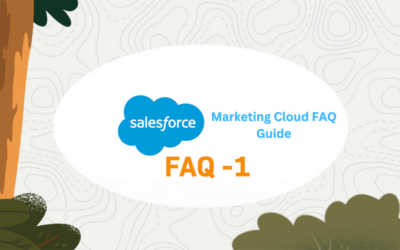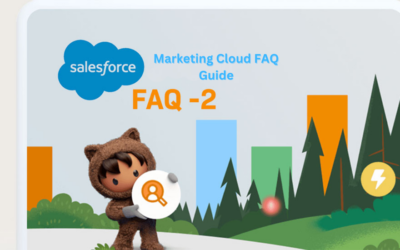In today’s digital age, businesses are continually seeking innovative ways to connect with their audience, personalize their marketing strategies, and drive revenue growth. Salesforce Marketing Cloud has emerged as a powerful tool that empowers organizations to achieve these objectives. However, to harness the full potential of this platform, you need a skilled Salesforce Marketing Cloud Consultant or Architect.
Hiring the right consultant or architect can be a game-changer for your business. To ensure you make the best choice, you need to conduct a comprehensive interview that assesses your knowledge, skills, and experience. In this article, we will delve into the top 20 interview questions and answers to evaluate your next Salesforce Marketing Cloud Consultant or Architect. If you need assistance with Salesforce CRM setup and optimization, companies like CRM Force can provide valuable expertise and support.
1- What is Salesforce Marketing Cloud, and how does it differ from other Salesforce products?
Answer: Salesforce Marketing Cloud is a comprehensive marketing automation platform that allows businesses to create and manage customer journeys, email campaigns, social media advertising, and more. Unlike other Salesforce products, Marketing Cloud focuses exclusively on marketing and engagement.
2- What are the key components of Salesforce Marketing Cloud, and how do they interact with each other?
Answer: Salesforce Marketing Cloud comprises Email Studio, Social Studio, Advertising Studio, Web Studio, and Journey Builder. These components work together to enable seamless customer engagement across various channels.
3- What is the importance of the significance of data extensions in Salesforce Marketing Cloud?
Answer: Data extensions are essential for storing and managing data within the Marketing Cloud. They enable personalization, segmentation, and targeting in marketing campaigns by organizing customer data effectively.
4- How does Salesforce Marketing Cloud integrate with other Salesforce products, such as Sales Cloud and Service Cloud?
Answer: Marketing Cloud can integrate with other Salesforce products through connectors and APIs, allowing for the seamless flow of customer data and insights across different departments.
5- What is Marketing Cloud Connect, and how can it benefit an organization?
Answer: Marketing Cloud Connect is a feature that enables bi-directional synchronization between Salesforce Sales Cloud and Marketing Cloud. It enhances collaboration between sales and marketing teams and facilitates a 360-degree view of customer interactions.
6- Explain the CAN-SPAM Act and its relevance to email marketing in Salesforce Marketing Cloud.
Answer: The CAN-SPAM Act is a U.S. law that regulates commercial email messages. It is essential to comply with this law when sending emails through Marketing Cloud to avoid legal issues.
7- What are Sender Profiles and Delivery Profiles, and how do they impact email deliverability in Marketing Cloud?
Answer: Sender Profiles define the sender’s information, while Delivery Profiles control how emails are sent. Properly configured profiles are crucial for achieving high email deliverability rates.
8- What is A/B testing in email marketing, and how can it be implemented in Marketing Cloud?
Answer: A/B testing involves sending two different versions of an email to a subset of your audience to determine which performs better. Marketing Cloud allows you to set up A/B tests to optimize your email campaigns.
9- What are Automation Studio and Journey Builder in Salesforce Marketing Cloud, and how do they differ in functionality?
Answer: Automation Studio automates marketing tasks, while Journey Builder creates multi-step, personalized customer journeys. They serve different purposes but can be used together for comprehensive marketing automation.
10- How can you measure the effectiveness of a customer journey in Marketing Cloud?
Answer: Key performance indicators (KPIs) like open rates, click-through rates, conversion rates, and ROI can be used to measure the effectiveness of customer journeys.
11- What role does data segmentation play in creating personalized customer journeys, and how can it be achieved in Marketing Cloud?
Answer: Data segmentation involves categorizing your audience based on specific criteria. Marketing Cloud allows for dynamic segmentation, ensuring that customers receive relevant content throughout their journey.
12- What are Engagement Splits and Decision Splits in Journey Builder, and how do they impact the flow of a customer journey?
Answer: Engagement Splits allow you to evaluate customer behavior, while Decision Splits help you make choices based on specific criteria. They enable personalized branching within customer journeys.
13- What types of reports and dashboards are available in Salesforce Marketing Cloud, and how can they aid in decision-making?
Answer: Marketing Cloud offers various reports and dashboards, such as email performance reports and subscriber engagement dashboards, to provide insights into campaign performance and customer behavior.
14- How can you use Einstein Analytics in Marketing Cloud to gain deeper insights into customer data?
Answer: Einstein Analytics uses AI to provide predictive and prescriptive insights. It helps marketers understand customer behavior, identify trends, and make informed decisions.
15- What is the importance of A/B testing in Salesforce Marketing Cloud, and how can it be applied to improve campaign performance?
Answer: A/B testing allows marketers to experiment with different elements in their campaigns and determine which variations perform best. It helps optimize content, subject lines, and other campaign elements.
16- How can Marketing Cloud’s reporting capabilities help in refining marketing strategies over time?
Answer: Marketing Cloud’s reporting capabilities provide data on what works and what doesn’t. Marketers can use this information to make iterative improvements and refine their strategies for better results.
17- What is the purpose of the Marketing Cloud Connector, and how does it facilitate data synchronization with other Salesforce products?
Answer: The Marketing Cloud Connector allows seamless data integration between Marketing Cloud and other Salesforce products, ensuring that customer data is synchronized in real-time.
18- How can you set up a triggered email in Salesforce Marketing Cloud, and why is it valuable for marketing campaigns?
Answer: Triggered emails are sent automatically in response to specific customer actions or events. Configuring them in Marketing Cloud enables real-time, personalized communication with customers.
19- What is the role of SQL queries in Salesforce Marketing Cloud, and how can they be used for data manipulation and segmentation?
Answer: SQL queries in Marketing Cloud enable advanced data manipulation, segmentation, and automation tasks. Knowledge of SQL is crucial for optimizing data operations.
20- How does Salesforce CPQ handle scenarios where products have different pricing tiers or discounts for different customer segments?
Answer: Salesforce CPQ’s Price Rules allow organizations to define different pricing tiers or discounts for specific customer segments. For instance, wholesale customers may receive a different discount compared to retail customers. The Architect can create Price Rules that evaluate customer attributes, such as account type, to automatically apply the correct pricing or discounts when generating quotes, ensuring accuracy and consistency.
Conclusion
In conclusion, the role of a Salesforce Marketing Cloud Consultant or Architect is pivotal in today’s marketing landscape. These professionals are the architects of customer engagement, leveraging the platform’s capabilities to drive success for businesses of all sizes. Through this extensive guide, we have explored a myriad of technical aspects, strategies, and best practices that are essential for excelling in these roles. From email marketing intricacies to automation, data management, personalization, and compliance, the expertise of a Salesforce Marketing Cloud Consultant or Architect extends across the entire marketing spectrum. As organizations increasingly recognize the importance of delivering personalized and data-driven marketing experiences, the demand for experts in Salesforce Marketing Cloud continues to grow. By honing their skills and staying abreast of the latest developments in the field, these professionals play a pivotal role in shaping the future of marketing. Whether you’re evaluating potential candidates or aspiring to be one, the knowledge and insights shared in this guide will undoubtedly serve as a valuable resource in your journey to success in the realm of Salesforce Marketing Cloud. To learn more about how CRM Force can assist you in recruiting top CRM talent and optimizing your CRM strategies for successful drip campaigns, contact us today. Together, let’s maximize your customer engagement. Contact Us today.





